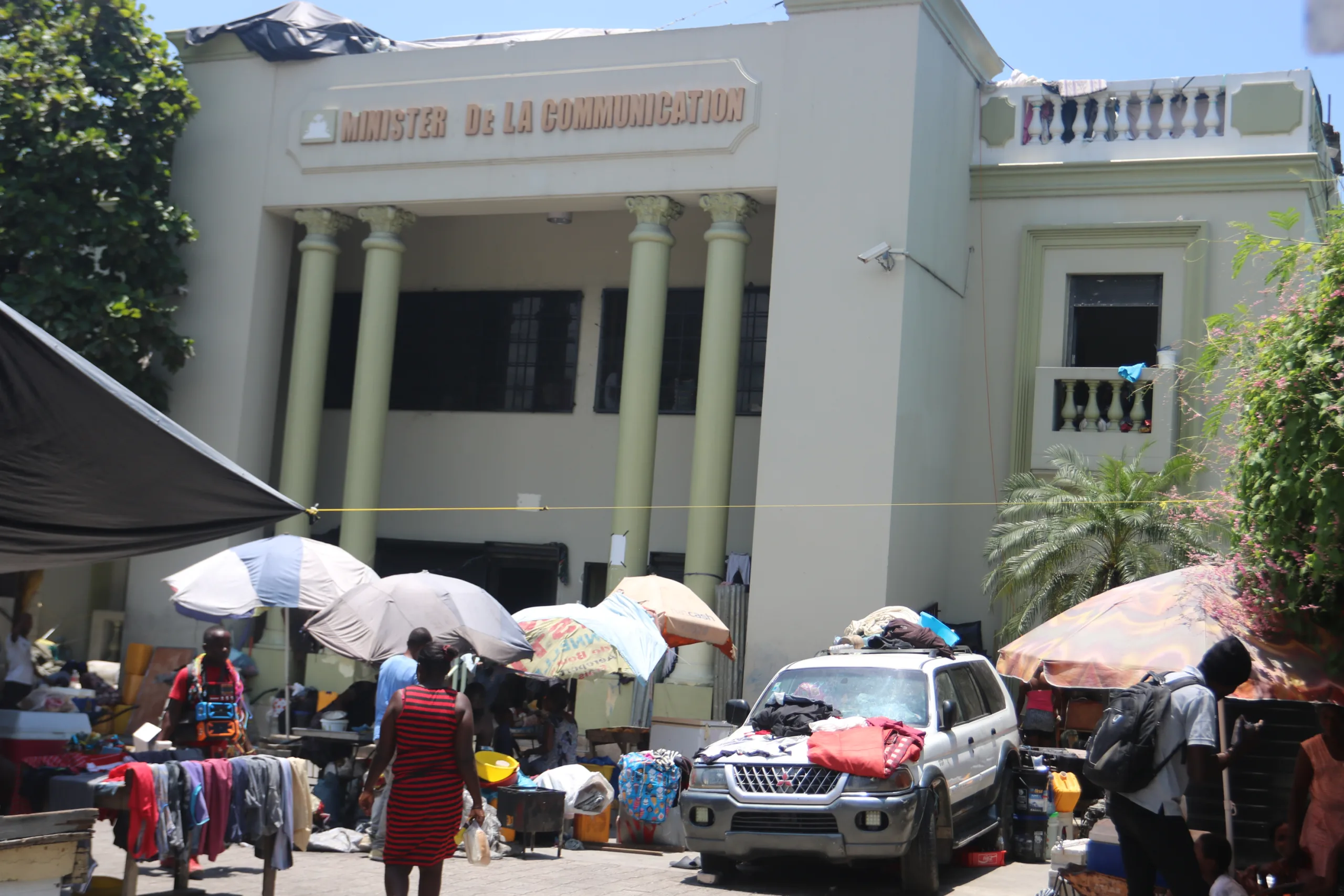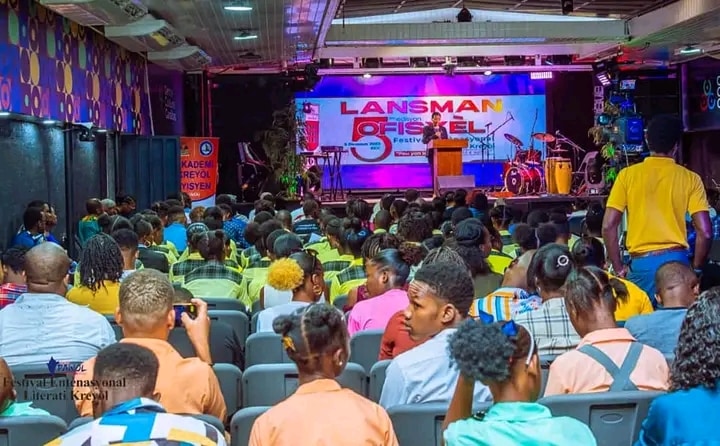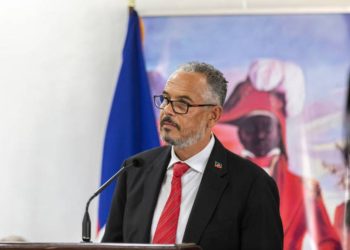Haiti has reached a critical turning point. Internal displacement, driven by crime-related violence, has risen to over half a million as of July 2024. This marks a staggering 60% increase since March, according to the International Organization for Migration (IOM) data released on July 2. The surge in displacement is a direct result of result of the rise in violence, which reached unprecedented levels in February during coordinated attacks by the gang coalition « VIV ANSANM » (Living Together). As violence intensifies and numbers surge, citizens continue to adapt, showcasing determination to survive in makeshift housing sites.
Gang clashes as well as their deadly incursions in Port-au-Prince and provincial cities, have deepened the humanitarian crisis in Haiti. Nearly 580,000 people have been displaced, including 310,000 women and girls and 180,000 children. According to the IOM, 80% are sheltered by foster families, while 20% are scattered across over 114 makeshift sites in schools, churches, and public squares.These displaced individuals face overcrowded conditions with inadequate hygiene and basic sanitation, as local and international organizations struggle to provide effective help far from being satisfied according to level of needs.
A dozen internally displaced people (IDPs) shared their harrowing stories of survival with our newsroom after two months of follow-up in various city center shelters. Stories brimming with both lament and hope. Like Rose’s (not her real name), a 66-year-old woman living in a city center shelter, was exhausted and despairing. She said “I cannot continue to live like this. It is not worthy of a human being. I lived well at home, today I sleep on the floor,” before breaking down in tears.“What kind of nation are we? We are not fighting against foreigners It is because of our own brothers’ ambition that we live like this. If I am eating dust here, it is because of gangs.” Now, she awaits death. “I assure you, sometimes I feel it is close! God should take my life away as soon as possible. It would be a deliverance. I have worked too hard to end up like this because of my own brothers.” she said, her heart filled with bitterness.
Violence,conflict, and forced displacement
Violence has plagued the Haitian capital since before the assassination of President Jovenel Moïse on February 7, 2021, but in 2023 and 2024 that the situation has been a major concern. Gangs have seized control of most of the country’s capital, continuing their reign of terror. In February 2024, the gang coalition « Viv Ansanm, » an alliance of the country’s gang leaders, re-emerged, sparking a dramatic escalation of violence in the southern districts, particularly Carrefour and Gressier according to the National Platform for Human Rights Progress (PNPDH). Between February 9th and June 25th, nearly 75 people were killed in Carrefour and six in Gressier, where two-thirds of the houses were abandoned.
During the same period, in Bas-Delmas nearly all residents had fled as assailants set fire to and looted dozens of houses in Delmas 3, 5, 24, 26, 28, and Solino. They also torched the two main sub-police stations in Delmas 3 and Delmas 28, leaving the area in ruins.
The chaos in Port-au-Prince under the « Viv Ansanm » coalition’s siege is unmistakable. Once lively streets are now shrouded in fear and uncertainty. People avoid the notoriously gang-controlled areas, where even the National Police (PNH) hesitates to intervene.
Nightlife in Port-au-Prince is virtually non-existent, with streets emptying as soon as the sun sets, giving way to darkness and tension. The few lights that persist are often from sudden fires in the suburbs, signaling new gang assaults. Constant fear grips the neighboring communes and neighborhoods, especially Solino, which straddles Port-au-Prince and Delmas. Here, community resistance has withstood attacks for over 12 months from the Bel-Air gangs led by Kempes, and more recently from the Bas-Delmas gangs led by Jimmy Chérisier aka Barbecue. Although a large majority have taken refuge in nearby sites like churches and schools, they have not succeeded in making everyone flee. In contrast, areas like Carrefour-Feuille saw thousands of residents flee the « Team Ascenseur » gangs between August 4th and 16th, 2023.
Bandits from Grand-Ravine led by Renel Destina aka Tilapli have invaded several neighborhoods in the southern region of Port-au-Prince, including: Savanne Pistache, Saye, Fouchar, Decayette, and Anba Figue. They have killed at least 54 people and displaced thousands, who are now sheltered in various schools and academic institutions that have become makeshift IDP camps, according to the National Human Rights Defense Network (RNDDH). Many of these people live at Anténor Firmin High School, Ministry of Communication, Fritz Pierre Louis High School, and College of Applied Linguistics (FLA).
In May 2024, despite appeals from Bruno Maes, interim coordinator of the United Nations Office of Humanitarian Affairs, to cease violence and allow humanitarian aid, gang members continued their reign of terror. They intensified their assaults, both during the day and late at night, particularly targeting neighborhoods like Solino. Despite the resistance from a dedicated community of resident police officers and the youth, Solino remains under constant threat.
To guard against attacks, residents have set up alarms and barricades at every entrance and exit of the neighborhood, a situation which is mirrored in many other coveted neighborhoods. According to an article by Ayibpost, at least ten barricades have been erected at the entrances of several districts in the Port-au-Prince metropolitan area. This grassroots effort highlights the authorities’ indifference, forcing citizens to take their own measures to protect themselves. However, these security measures have been insufficient to curb the ever-growing ambitions of the gangs.
Since last year, human rights organizations such as the Citizens’ Organization for a New Haiti (OCNH) and RNDDH have been raising alarms about the cycle of violence. According to the United Nations High Commissioner for Human Rights, nearly 2,500 people, including at least 82 children, were killed or injured in gang-related violence during the first quarter of 2024. In July 2023, RNDDH reported 75 cases of murder across communes including Croix-des-Bouquet, Petion-Ville, Tabarre, Port-au-Prince, and Carrefour, with significant unrest also reported in the Artibonite department, where hundreds of residents have fled.
The surge in internal displacement figures
The International Organization for Migration (IOM) has been monitoring IDPs across various regions of the country for several years, publishing a dozen reports on their evolving situation between 2022 and 2024. According to their tracking data, in collaboration with the General Directorate of Civil Protection (DGPC), a government agency under the Ministry of Interior and Local Authorities (MICT), the number of people displaced by gang violence was estimated at 96,000 between June and August 2022. This figure then surged threefold in under five months.
- March: 127,977
- June: 130,884
- July: 143,209
July, the situation worsened again, with IOM estimating around 143,209 displaced individuals, divided into 32,527 families in the West alone, half of whom are children.
- Port-au-Prince: 48,615
- Delmas: 39,978
- Cité-Soleil: 17,118
- Croix-des-Bouquet: 7,026
- Tabarre: 5,807
All areas controlled by gang leaders. Those graphs are constructed from OIM data otherwise, the percentage expressed is the ratio of a single unit to the total number of units considered. Other affected municipalities included Pétion-Ville, Thomazeau, and Cornillon Grand-Bois.
March: 116,000
June: 270,000
According to another IOM report published on July 24, 2024, 95% of internal displacements are due to gang violence. Philippe Branchat, Head of Mission in Haiti for the organization, noted that these figures reflect years of escalating violence, which peaked in February, with a catastrophic humanitarian impact. The number of displaced individuals in the South region has doubled in four months.
Surviving on the edge: life in overcrowded shelters
In a makeshift shelter at the Faculty of Applied Linguistics (FLA) on Rue Dufort, nestled between Lalue and Bois-Verna, several dozen families have been living in cramped conditions since March 2024. These families are housed in rooms originally intended for 60 to 70 students, now divided by sheets. Jean Louis is the General Secretary of the Committee, who oversees internal management, there is one in all sites including those where government agents are present. The committee handles communication for humanitarian visits and conflict management, among other tasks.
Louis highlights that hunger is the main issue. “Most people here did not have jobs before, those who did had small businesses or worked in markets, and are now idle. They need food. While organizations provide healthcare, people here are hungry,” he said, representing the 315 households out of 1,282 individuals currently living at Rue Dufort according to their own census.
The Faculty has been undergoing renovation for a year, and in one of the incomplete toilet blocks on the first floor, a mother of five, Darlène (a pseudonym), tries to make do. A brave young woman struggling with heart problems, she faces daily challenges balancing the need to feed her children, manage her illness, and deal with the poor living conditions. Previously from Carrefour-Feuille, she was displaced by gang attacks in August 2023. After narrowly escaping, she initially sought refuge at Marie Jeanne High School, where conditions were poor. She later moved to Lespinasse National School, a public primary school, with other displaced families. However, she was forced to leave there due to escalating tensions between the Haitian National Police (HNP) and outlaws near the presidential palace in early March.
As Darlène recounts her ordeal, her youngest daughter sobs, overwhelmed by the sight of her mother’s tears. The future toilet block on the first floor of the FLA has become their makeshift home. At the entrance, a small table next to the stairs is cluttered with gallons of alcohol, surrounded by cookies, sweets, and other treats. Beside the table stands an Igloo cooler filled with drinks and water ; Darlène’s modest attempt to support her children. Inside, a coal stove sits ready for use, and she prepares to set a fire for breakfast. Her children had not eaten that day.
Darlène, a fragile yet determined mother, avoids the crowded lines for humanitarian aid due to her health but remains focused on ensuring her children’s survival after their father was killed. Her husband had returned to Carrefour-Feuille to retrieve some belongings when bandits killed him and burned their house. “We imagine those men had a reason to commit such an atrocity. What’s done is done, » she said, resigned. “I have no one to count on now; I have to fight for my children’s survival.” she explained, despite her heart problems.
Her greatest concern is her children’s education. « I try to survive with my children, but unfortunately they cannot go to school,” she said, expressing her desire to move to the countryside. However, both major national roads connecting the capital to provincial towns are controlled by armed groups that have set up toll stations, drastically inflating transportation costs. Some organizations are helping households relocate outside the capital, but Darlène has yet to find such assistance.
Many people have fled to the provinces, according to IOM reports, including Joshua (a pseudonym), a 29-year-old accountant. After spending 15 years at Route de Frères near the Police Academy, an area controlled by the gang « Kraze Baryè » led by Vitelhomme Innocent, he was forced to flee southeast with his wife and 4-year-old son a year ago. One morning, as he was heading to work, hooded men threatened him at gunpoint. “At the time, I was working in a currency exchange office and quickly felt targeted,” he recounted in a telephone interview. On the advice of relatives, he left the area and moved to his hometown of Jacmel, which he describes as a haven of peace However, he must start anew there, and he has been unemployed since his arrival.
For Joshua, the move to Jacmel provided physical safety, but not everyone has the same opportunity. Many displaced people living in temporary shelters are considering taking the national roads to find safety. Marguerite (a pseudonym), a woman in her sixties who has been living in the backyard of the Ministry of Communication for several months, expressed her desire to leave as well. “What I need at the moment is to leave the capital, join relatives in the provinces, and wait for my quiet death. Port-au-Prince is no longer a place for me,” she said. She is slowly losing mobility. Sitting with her three friends, she shared insights into their daily lives.” Here, survival is solidarity. We have nothing, and when we find something, we share it,” she explained.
Solidarity is crucial for this small circle of women surrounding Marguerite. They all sleep in the same room and share everything they find. “Everything one of us benefits from belongs to each of us. This is how you have to live if you want to survive,” she said. Many of them believe the solution to their predicament is to return home.
Nearby, Dieussibon (a pseudonym), their neighbor, resides in the carcass of an old car in the courtyard. His journey has been longer and more arduous, especially given his foot disability from a car accident. This former driver fled several neighborhoods, starting in Pernier in the commune of Tabarre, where his house was completely destroyed. He then moved to Carrefour-Feuille but was unable to stay due to the mass exodus from the area.
Father of two daughters, ages 13 and 16, Dieussibon is separated from them because he cannot afford to feed them. They are with relatives, while he remains alone, lacking everything. For him, the greatest help would be a home and the means to start a small business, allowing him to regain his confidence and provide for his teenage daughters’ needs.
Challenges surrounding their civil status
According to Maître Camille Occius, Executive Director of the Citizenship Organization for a New Haiti (OCNH), the civil status of displaced persons in these sites is alarming, compounding their fundamental rights issues. Many people lost their identity documents while fleeing violence, a situation that has significantly hindered their ability to enjoy basic rights, he explained during an interview in his office.
According to the human rights defender, the lack of identity documents severely impacts displaced persons’ socio-economic rights, as the national identity card is crucial for accessing humanitarian aid. To address this issue, the organization has urged the government to deploy mobile units in the sites to quickly record and issue identity documents. This is an obligation mandated by the presidential decree of May 26, 2006, Article 1, Paragraph 1. Furthermore, amid the chaos and pervasive uncertainty in the capital, the organization highlighted that during police checks, not being able to present an identity document can lead to incarceration or even execution, as stated in their report.
Out of 12,633 people surveyed across five sites, 733 individuals lost at least one identity document, amounting to a total of 952 lost documents, including national identity cards, birth certificates, and passports. As part of its efforts, the organization has helped 84 people replace their documents. While this is a modest response, Mr. Camille Occius promises to continue assisting the displaced by advocating for authorities to take the necessary actions.
Resilience: the key of their survival
Marie Jeanne High School is a major refuge for IDPs in the city center, housing 6,261 individuals, including 2,309 women. This site, like the Ministry of Communication, is marked by extreme precariousness, with residents living in tents, small prefabricated houses, or makeshift shelters covered with waterproof sheets. Despite the challenging conditions, the inner courtyard is bustling with activity, featuring stalls selling fries and fruits. This scene is typical across many accommodation sites we visited, including Marie Jeanne High School on Impasse Lavaud or Anténor Firmin High School on Avenue Charles Summer near by the Ministry of Justice and Public Security (MJSP). Many families have started small businesses to survive amidst these harsh circumstances.
Reneld, a communication manager for the Marie Jeanne site committee, noted that many residents, primarily from Carrefour-Feuille, Rue de la Réunion, and Solino, are starting small businesses within the shelters to support themselves and regain some economic stability. Most displaced individuals who spoke with us expressed a strong desire to develop their own commercial ventures. For example, Rose, the 66-year-old woman we have mentioned above,hopes to start selling peanuts as a way to avoid begging for food.
According to committee managers, while NGO interventions are currently improving conditions, long-term strategies are essential. Reneld explains that organizations should focus on sustainable solutions, such as providing training to foster creativity and self-reliance in addition to offering cash transfers or other aid. “For instance, a young parent with two or three children might spend all of a cash transfer quickly, but if trained to create valuable items, they could use the money more wisely and sustain themselves longe,” said Reneld, advocating for support that aims to empower families to become self-sufficient, as many are eager to build their own future.
Local and International Organizations: their response and impact
The National Council of Young Leaders – Chics (CNJL-C), a Christian organization dedicated to leadership development, is led by Executive Director Jessica Jerôme. She shared insights into her organization’s efforts to support displaced households, emphasizing their commitment to “reduce their suffering and preserve their dignity” through solidarity and empathy.
“CNJL-C does not always intervene directly in the camps, we support partners who do,” said Jerôme. This support includes preparing kits for refugees and assisting with their distribution. “We have helped people in a dozen sites, including the camp at the Methodist Church at Delmas 95, the National School of Colombia, Camp Darius Denis, Camp Kay Pasteur, the Nazarene Seminary of Haiti, and the one at Route de Frères,” she said.Most beneficiaries received food kits containing supplies for a household of five for about a month, she estimated. The kits typically included items such as salt, rice, corn, sugar, milk, and herring. These efforts were made possible through their international partner, “Samaritan’s Purse”, and the organization’s volunteer members.
Despite its interventions, the young organization believes it is ultimately the State’s responsibility to act, according to Principle 28 of the Guiding Principles on Internal Displacement. “The Haitian State should create conditions conducive to the safe and dignified return of displaced persons to their homes, or facilitate their voluntary resettlement in another part of the country, and provide the necessary means for this,” she said.
Jean Julien Jimmy, the technical coordinator of the Western Department for the General Directorate of Civil Protection (DGPC), manages disaster risk and coordinates interventions at hosting sites. I spoke with him in a tent-shelter. DGPC agents are present in over 37 sites in the West and other parts of the country, ensuring the “management of the displaced” and leading NGO interventions. Working closely with IOM, Jimmy claims to fight for the survival of the displaced. « We do what is necessary, even if responses don’t always arrive on time or meet expectations,” he said. He mentioned that the Port-au-Prince town hall and the DGPC have response plans, though he did not disclose details. However, he emphasized that there is a broad plan for addressing people’s needs, such as facilitating help for those who decide to move to the provinces. Civil protection can ensure the follow-up on their situation through regional offices. As for the possible return of the displaced to their homes, it depends entirely on the security situation.
Many organizations have attempted to provide solutions. The Adventist Development and Relief Agency (ADRA), an international organization of the Seventh-day Adventist Church, intervened in 2021 through several resettlement projects in collaboration with IOM.
The World Food Program (WFP) has been particularly active this year. According to an intervention report published in May 2024, 735,639 people were assisted with more than $2.7 million in transfers and 1,837 tons of food .» Additionally, an emergency program reached more than 189,840 people with 1,094 tons of food, including 256,237 hot meals for 38,130 people. The majority of these were internally displaced, with 28,457 in the metropolitan area. The report also mentioned $1.46 million in cash transfers to 60,710 people including IDPs.
As part of its resilience activities, WFP reported community asset rehabilitation and reconstruction efforts affecting nearly 3,669 families, totaling $553,135 and impacting 18,345 people nationwide. In May, from the 18th to the 21st, 32 tons of medical and non-food supplies landed in Haiti for the response to the displaced and for UNICEF and IOM operations, WFP wrote in its “Haiti country strategic plan (2024–2028).”
IOM has provided humanitarian assistance to nearly a thousand people, including annual housing subsidies, hygiene kits, and medical and psychosocial care. IOM specified that various forms of assistance are provided, including rent assistance primarily overseen by the DGPC and UCLBP (Housing and Building Construction Unit, a state body promoting social housing). « This assistance follows the guidelines of the shelter and non-food items cluster » said IOM. The current guidelines allocate about 50,000 gourdes ( $300 USD ) for rent and a maximum of 18,500 gourdes ($100 USD) additional to help with other fees. « In 2023, 7,896 people received support for their relocation. Since January 2024, more than 3,000 displaced people have benefited from rental assistance » said OIM.
Last February, IOM supplied nearly 5 million liters of drinking water to approximately 25,000 people and refurbished 22 manual water pumps. More than 37,000 people have received relief supplies such as blankets, water containers, solar lights, kitchen utensils, and plastic sheets. Mobile clinics have been deployed to offer medical assistance to 18,000 people and psychosocial support through a free telephone line in every camp.
A well-defined public policy to address the issue
Human rights defender Maître Camille Occius asserts that the State is obligated to implement a decent housing policy for its citizens. While civil society organizations can continue identifying affected individuals to facilitate state intervention, “it is up to the State to establish trust.”
Maître Occius emphasizes the urgency of the situation, lamenting that successive governments have done little to facilitate the return of displaced people to their homes. The new transitional government, composed of a council of nine presidents, including two observers and a Prime Minister, has promised to regain control and enact change. These promises echo those of former Prime Minister Ariel Henry, who, after 30 months in office, failed to deliver tangible results. In March, insecurity prevented him from returning from a diplomatic tour, as gangs intensified their assaults on police stations and the Port-au-Prince international airport, leading airlines to cancel flights.
The new head of government, Garry Conille, who took office a month ago, is being urged to prioritize action over empty promises. In an address to the nation on July 17, Conille acknowledged the chaos and daily struggle for survival, pledging “immediate and decisive action.” That same evening, he declared a « state security emergency » in 14 municipalities controlled by gangs, a measure aimed at preventing armed groups from holding the population hostage.
“Restoring order and security remains our top priority,” Conille said, calling for the deployment of the Multinational Security Support Force (MSS), which consists of 400 Kenyan police officers who arrived in Haiti between June 25 and July 16. “The ultimate goal is to reclaim areas occupied by gangs; house by house, neighborhood by neighborhood, city by city,” has said repeatedly Mr Conille since he had taken office.
According to Clarens Renois, leader of the political party UNIR, addressing the insecurity and humanitarian crisis requires a three-pronged approach: force, justice, and social actions. «We must tackle the gangs from multiple angles: first, by using force to eliminate those who carry weapons and commit crimes; second, through justice to prosecute those who finance them and finally, through social intervention by the State,” he said.“On the social level, the State must intervene to extinguish the gangs’ influence permanently by providing support measures that give hope to young people, ensuring that those inclined to return to gang life see no reason to do so.”
For now, no one knows when the IDPs will be able to return home. “We believe they should receive long-term support,” explained Mr. Clarens Renois, advocating for State assistance to help them rebuild their homes and rehabilitate their neighborhoods. “This cannot be done haphazardly. We must first identify them and implement a fair support policy. Financial support is essential so that people can regain a semblance of normal life,” he emphasized.
Attention is now focused on the multinational security support mission (MSS) to bring hope. The mission is expected to include nearly 2,500 police officers, with 1,000 from Kenya. Currently, 400 Kenyan officers are on-site supporting both local police and the Haitian Army (FADH). “
If the MSS can restore security, reopen roads, and enable people to return to their neighborhoods, it would be beneficial for everyone,” said Clarens Renois. However, he stressed that once the mission concludes, national security forces must be capable of taking control to prevent future crises. In the meantime, Haitian citizens are urged to be patient and participate in the « national security sensitivity campaign » launched by the Prime Minister, which calls for active community involvement in neighborhood security.




